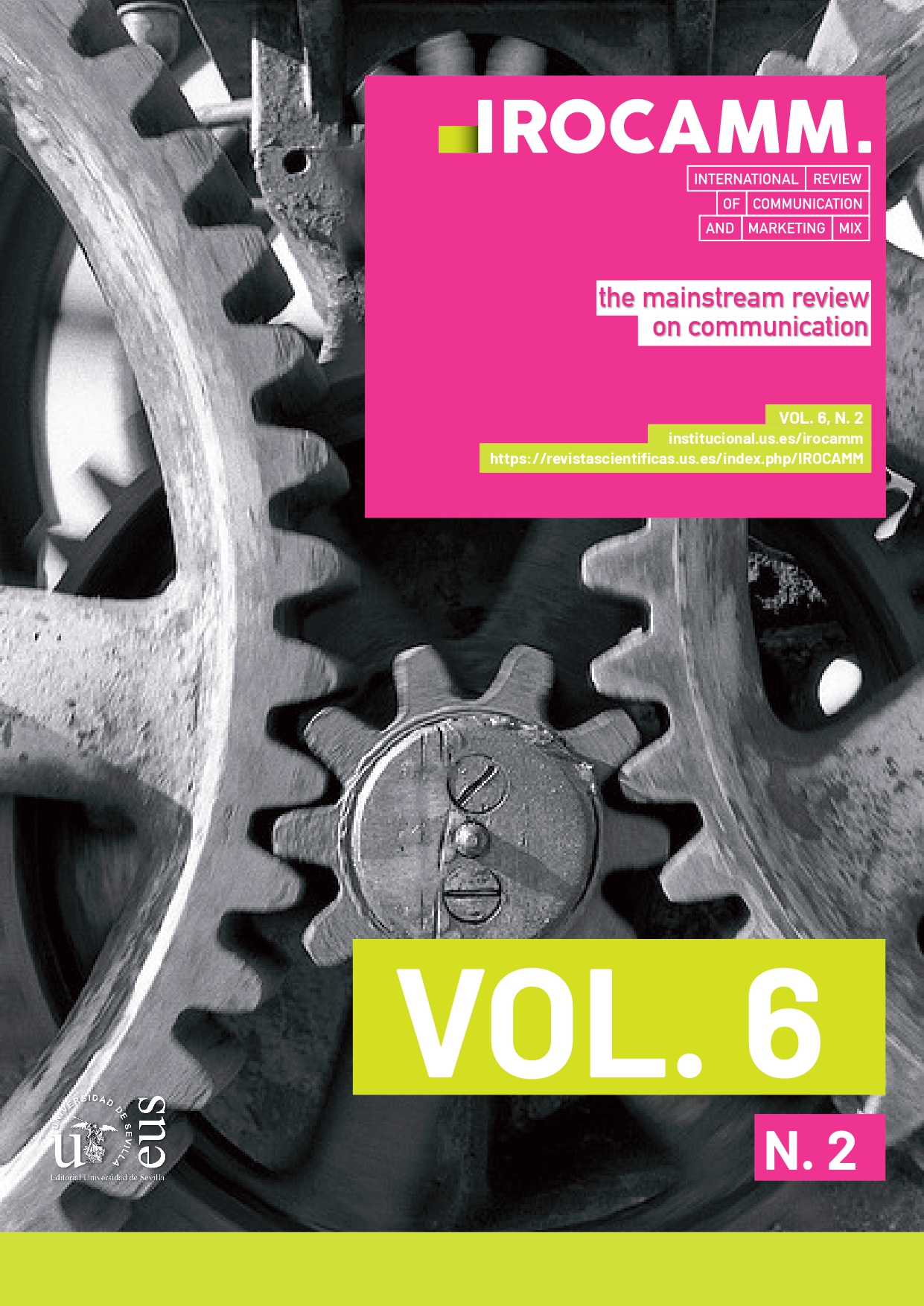The need to regulate de lobbying activities in Spain: The path towards the standardization of transparency
DOI:
https://doi.org/10.12795/IROCAMM.2023.v06.i02.01Keywords:
Lobbying, Public Affairs, interest groups, public relations, transparency, influenceAbstract
Lobbying is the name given to the adoption of actions by interest groups to influence public agents’ political decisions. This practice is a field of public relations, as it requires establishing a dialogue with the representatives of the institutions. Traditionally, it has been associated with opacity, against which the fight had started in Spain with the recent draft of the Law on Transparency of Interest Groups, which has been paralyzed due to general elections being called in advance for July 2023. Although the regulatory shortcomings make lobbying a difficult object of study, the following aspects have been pointed out as factors that contribute to the capacity of influence of an interest group: its number of members; its age; its economic capacity; the type of interests it defends, and its degree of specialization. We must also highlight the participation in public committees, the number of employees, and the practice of indirect lobbying. The standardization of the transparency efforts of Spanish lobbies, including their self-regulation, will be vital to accept them as legitimate participants in the public sphere. At the same time, they would also benefit from having representatives in Brussels and specialized internal structures.
Downloads
References
Aguilar, I. (2021). Los riesgos de la corrupción de los lobbies. Revista Española de la Transparencia, 12(2021), 125-144. https://doi.org/10.51915/ret.122
Álvarez Vélez, I.; De Montalvo, F. (2014). Los lobbies en el marco de la Unión Europea: Una reflexión a propósito de su regulación en España. Teoría y Realidad Constitucional, 1(33), 353-376. https://doi.org/10.5944/trc.33.2014.13025
Anteproyecto de Ley de Transparencia e Integridad en las Actividades de los Grupos de Interés. Documento sometido a Trámite de Información Pública, de 14 de noviembre de 2022, Ministerio de Hacienda y Función Pública. https://acortar.link/dlR5dH
Aranda Álvarez, E. (2017). ‘Parlamento abierto’: una visión desde los principios de funcionamiento de las cámaras parlamentarias. Revista Española de Derecho Constitucional, 111, 13-43. https://doi.org/10.18042/cepc/redc.111.01
Baumgartner, F.-R.; Leech, B.-L. (1998). Basic Interests: The Importance of Groups in Politics and in Political Science. Princeton University Press.
Baumgartner, F.-R.; Leech, B.-L. (2001). Interest niches and policy bandwagons: Patterns of interest group involvement in national politics. Journal of Politics, 63(4), 1191-1213. https://doi.org/10.1111/0022-3816.00106
Burstein, P.; Linton, A. (2002). The impact of political parties, interest groups, and social movement organizations on public policy: Some recent evidence and theoretical concerns. Social Forces, 81(2), 380-408. https://doi.org/10.1353/sof.2003.0004
Castillo Esparcia, A. (2018, 30 de julio-3 de agosto). Lobby y poder legislativo en España [sesión de conferencia]. XIV Congreso de la Asociación Latinoamericana de Investigadores de Comunicación (ALAIC): Comunicación en Sociedades Diversas. San José, Costa Rica. https://acortar.link/CCHVDt
Chalmers, A.-W.; Shotton, P.-A. (2016). Changing the face of advocacy? Explaining interest organizations’ use of social media strategies. Political Communication, 33(3), 374-391. https://doi.org/10.1080/10584609.2015.1043477
Crespo Val, V. (2021). Estrategias de comunicación de lobbying indirecto. El lobby de la alimentación frente a un impuesto a bebidas azucaradas en España (2016-2019) [Tesis doctoral, Universidad San Pablo CEU]. Repositorio Institucional CEU. https://acortar.link/rj8PkI
Davidson, S. (2015). Everywhere and nowhere: Theorising and researching public affairs and lobbying within public relations scholarship. Public Relations Review, 41(5), 615–627. https://doi.org/10.1016/j.pubrev.2014.02.023
De Bruycker, I.; Beyers, J. (2015). Balanced or biased? Interest groups and legislative lobbying in the European news media. Political Communication, 32(3), 453–474. https://doi.org/10.1080/10584609.2014.958259
Díaz-Luque, P.; Jiménez-Marín, G. (2013). La web como herramienta de comunicación y distribución. Análisis y modelos. Questiones publicitarias, 18(1), 39-55.
Elguero y Merino, J.-M. (2018). Lobby y grupos de presión: análisis regulatorio y estudio en el sector asegurador [Tesis doctoral, Universidad Complutense de Madrid]. E-Prints Complutense. https://acortar.link/6fOWEw
Fisker, H. M. (2015). Dead or Alive? Explaining the Long-Term Survival Chances of Interest Groups. West European Politics, 38(3), 709-729. http://doi.org/10.1080/01402382.2014.962246
García Lorenzo, A. (2001). La participación de los grupos de interés en el proceso político de decisión: el caso de la Unión Europea [Tesis doctoral, Universidade da Coruña]. Repositorio Universidade Coruña (RUC). https://acortar.link/3uAY1W
Hanegraaff, M.; van der Ploeg, J.; Berkhout, J. (2020). Standing in a crowded room: Exploring the relation between interest group system density and access to policymakers. Political Research Quarterly, 73(1), 51-64. https://doi.org/10.1177/1065912919865938
Hayes-Renshaw, F.; Wallace, H. (2006). The Council of Ministers. Palgrave MacMillan.
Koch, T.; Schulz-Knappe, C. (2021). Corporate lobbying: Role perceptions and perceived influence on political decisions of public affairs professionals. Public Relations Review, 47(4), 1-7. https://doi.org/10.1016/J.PUBREV.2021.102062
Latonda Pedraza, M.-A. (2014). El sistema de intermediación de intereses y los grupos de interés en el sector eléctrico español [Tesis doctoral, Universidad de Valencia]. Base de Datos de Tesis Doctorales (TESEO) del Ministerio de Universidades. https://acortar.link/PMRE9p
Lowery, D. (2007). Why do organized interests lobby? A multi-goal, multi-context theory of lobbying. Polity, 39(1), 29-54. https://doi.org/10.1057/palgrave.polity.2300077
Mamontova, E.; Buryk, Z.; Strikha, L.; Vonsovych, S.; Vopayeva,T.; Baranova, O. (2021). The modern experience of lobbying interests in Europe. Estudios de Economía Aplicada, 39(8), 5. https://doi.org/10.25115/eea.v39i8.6203
Muñoz Jodar, M.-C. (2022). Geopolítica del lobbying: hacia la privatización de la decisión política [Tesis doctoral, Universidad Complutense de Madrid]. E-Prints Complutense. https://acortar.link/aoh5uh
Nownes, A.-J. (2015). Organizational demography research in the United States. En. Lowery, D.; Halpin, D.; Gray, V. The organization ecology of interest communities: Assessment and agenda (pp. 17-36). Palgrave Macmillan.
Oliver González, A. B. (2018). Efectos de la comunicación persuasiva de los lobbies en las decisiones de las instituciones comunitarias y países miembros entre 2005 y 2015. [Tesis doctoral, Universidad Complutense de Madrid]. E-Prints Complutense. https://acortar.link/jx1law
Ponce Solé, J. (2019). Mejora de la regulación, lobbies y huella normativa. Tirant Lo Blanc.
Pulido, M. (2018). Acts or events? A perspective from the marketing mix. IROCAMM-International Review Of Communication And Marketing Mix, 1, 55-66. https://doi.org/10.12795/IROCAMM.2018.i1.04
Proposición de Ley Integral de Lucha contra la Corrupción y Protección de los Denunciantes. Boletín Oficial de las Cortes Generales, Congreso de los Diputados, 33-4, de 19 de diciembre de 2017, 1-229. https://acortar.link/U0xM7o
Revuelta, A; Villoria, M. (2016). La regulación de los grupos de interés como instrumento de prevención de la corrupción. En Villoria Mendieta, M; Gimeno Feliu, J.-M.; Tejedor Bielsa, J. La corrupción en España. Ámbitos, causas y remedios jurídicos (pp. 409-434). Atelier.
Rotondo Ruiz, M.-R.; Rubio Núñez, R. (2017). Spain. En Bitonti, A.; Harris, P. Lobbying in Europe: Public Affairs and the Lobbying Industry in 28 EU Countries (pp. 313-324). Palgrave McMillan.
Rubio Núñez, R. (2002). Los grupos de presión en España. Una revisión pendiente. Revista de las Cortes Generales, (55), 165-188. https://doi.org/10.33426/rcg/2002/55/837
Rubio Núñez, R. (2018). La nueva ola de regulación de los grupos de presión parlamentarios. Foro: Revista de ciencias jurídicas y sociales, 21(2), 397-420. http://dx.doi.org/10.5209/FORO.64032
Rubio Núñez, R.; Gonzalo Rozas, M. Á. (2017). Vías de participación en el parlamento. ¿Parlamentos abiertos? En Pérez-Moneo, M. y Vintró i Castells, J. Participación Política: Deliberación y Representación en las Comunidades Autónomas (pp. 145-179). Congreso de los Diputados.
Rubio Núñez, R.; Marañón Martín, L.; Gonzalo Rozas, M.-Á. (2021). ¿Existe el lobby ciudadano? Una experiencia de participación en el Congreso de los Diputados. Revista de las Cortes Generales, (110), 235-271. https://doi.org/10.33426/rcg/2021/110/1573
Rubio Núñez, R.; Marañón Martín, L.; Gonzalo Rozas, M.-A. (2022). Orientaciones para mejorar la efectividad e influencia en la participación ciudadana. http://doi.org/10.47919/FMGA.OC22.0109
Rubio Núñez R.; Vela Navarro-Rubio, R. (2017). Parlamento abierto: el parlamento en el siglo XXI. UOC.
Sentencia del Tribunal General de 12 de junio de 2014 - Intel/Comisión (Asunto T-286/09). Diario Oficial de la Unión Europea, 222, de 28 de julio de 2014, C 245/8. https://acortar.link/Eqk3pu
Seyfang, G.; Smith, A. (2007). Grassroots innovations for sustainable development: Towards a new research and policy agenda. Environmental politics, 16(4), 584-603. https://doi.org/10.1080/09644010701419121
Silva Robles, C.; Elías-Zambrano, R. (2011). Relaciones públicas 2.0 (y educomunicación): ¿de qué hablamos realmente? Un acercamiento conceptual y estratégico. Fonseca Journal of Communication, 3(2), 42-71.
Stevens, F.; De Bruycker, I. (2020). Influence, affluence and media salience: Economic resources and lobbying influence in the European Union. European Union Politics, 21(4), 728-750. https://doi.org/10.1177/1465116520944572
Uriarte, E. (2010). Introducción a la Ciencia Política. Tecnos.
Vargas Martín, J. (2023). El repentino adelanto electoral se lleva por delante la ley de familias y decenas de proposiciones legislativas. Público. https://acortar.link/rmpuc8
Vázquez-Portomeñe Seijas, F. (2022). Lobbying, influencias y corrupción. El art. 12 del Convenio del Consejo de Europa contra la corrupción como modelo tipo para la criminalización del lobbying oculto. Revista Electrónica de Ciencia Penal y Criminología, 24, 1-21. https://acortar.link/T2Bi3x
Villoria Mendieta, M.; Revuelta, A; Jiménez Sánchez, F. (2015, 13-15 de Julio). Transparencia y regulación del lobby en Europa y España [sesión de conferencia]. XII Congreso de la Asociación Española de Ciencia Política y de la Administración: “¿Dónde está hoy el poder?”. San Sebastián, España. https://acortar.link/2RJ2xg
Xifra, J. (1998). Lobbying. Cómo influir eficazmente en las decisiones de las Instituciones Públicas. Gestión 2000.
Xifra, J. (2009). Els lobbies. UOC.
Downloads
Published
How to Cite
Issue
Section
License
Copyright (c) 2023 IROCAMM - International Review Of Communication And Marketing Mix

This work is licensed under a Creative Commons Attribution-NonCommercial-ShareAlike 4.0 International License.
International Review Of Communication And Marketing Mix provides unrestricted access to its contents from the moment of publication in this electronic edition, and is therefore an open-access magazine. The originals published in this magazine are the property of the University of Seville and it is obligatory to cite their origin in any total or partial reproduction.' All content is distributed under a Creative Commons Attribution 4.0 (CC BY-NC-ND 4.0) license. This should be expressly stated in this way where necessary. You can consult the informative version and the legal text of the license.
The authors who publish in this journal agree to the following terms:
- The assignment of rights is made under the Creative Commons license.
- Authors may separately make additional arrangements for the non-exclusive distribution of the version of the work published in the journal (for example, placing it in an institutional repository or publishing it in a book), with an acknowledgement of its initial publication in this journal.
- Authors are allowed and encouraged to disseminate their work electronically (e.g. in institutional repositories or on their own website) before and during the submission process, as this can lead to productive exchanges, as well as earlier and more extensive citation of published work.
- The dissemination of the articles will be carried out on general social networks, ResearchGate, Mendeley, Academia.edu, Cosis, e-lis and other databases or full text repositories on the Internet with whom the journal establishes an agreement for their dissemination and visibility.
- Copyright is of two kinds: moral rights and economic rights. Moral rights are perpetual prerogatives, unrenounceable, untransferable, inalienable, unattachable and imprescriptible. Economic rights refer to the benefits obtained by the use or disclosure of the works. IROCAMM - International Review of Communication And Marketing Mix is exclusively authorized to make or authorize by any means the use, distribution, dissemination, reproduction, adaptation, translation or transformation of the work.
International Review Of Communication And Marketing Mix does not charge fees for submission of papers, nor does it charge fees for publication of its articles.



























